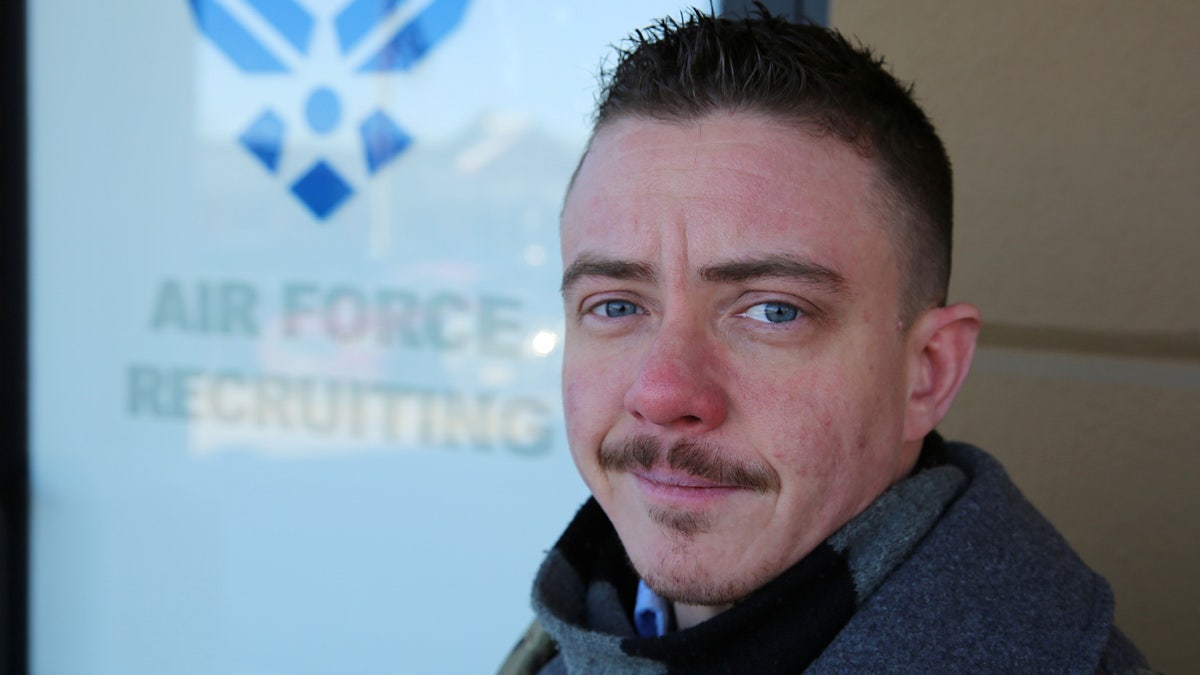
Nicholas Bade, 37, who is among the transgender Americans enlisting openly in the U.S. military, outside a recruitment center in Chicago earlier this month. (Reuters)
Transgender Americans are openly enlisting in the U.S. military for the first time -- and many say they feel courts will ultimately block President Donald Trump from banning their service.
Nicholas Bade, a 37-year-old transgender man who is among the first of what advocates expect will be a small but historic surge of enlistments, has wanted to join the military since he was young.
“I just couldn’t face the idea of doing it as a traditional female,” Bade told Reuters as he carried a folder of medical documents into an Air Force recruiting office in Chicago last week.
Although military officials have said they don’t know how many transgender people have enlisted since Jan. 1, advocates claim dozens, if not hundreds, of transgender people will seek to join an estimated 4,000 already serving.
PENTAGON SAYS TRANSGENDER PEOPLE CAN ENLIST, STARTING IN JANUARY
Aspiring transgender military service members told Reuters they were pushing ahead with enlistments despite lingering uncertainty about whether they would be welcome in the future.
“I‘m not worried,” Logan Downs, 23, an Oregon transgender man working to join the Air Force, told Reuters.
Trump caught the Pentagon off guard when he tweeted in July that transgender people would be banned from serving in the armed forces, citing health care costs and unit disruption.

Nicholas Bade, 37. (Reuters)
The Obama administration had decided in June 2016 to allow transgender service members to serve openly, and a deadline to start accepting recruits was set for Jan. 1, 2018. The decision came five years after the military ended its ban on lesbian, gay and bisexual people serving openly.
Trump’s reversal also blocked government-funded sex-reassignment surgery and other treatments for active-duty personnel.
SECOND US JUDGE HALTS TRUMP'S TRANSGENDER MILITARY BAN
However, federal judges in Baltimore and Washington blocked Trump’s decision.
A Pentagon review of the issue is set to be finalized in February and forwarded to Trump, who is expected to make a decision on the future of transgender personnel in March.
Bianca Wright, of Seattle, has waited to re-enlist after leaving the military and pursuing a gender transition following 14 years of service, including deployments to Iraq.
After Trump’s declaration, “that all came crashing down,” she said.
Critics of Trump’s ban pointed to a Rand Corporation study that estimated annual transgender health care accounted for only $2.4 million to $8.4 million of the more than $50 billion in Defense Department health care spending, or just a fraction of a percent.
Rand also found 18 other countries allowed transgender members to serve, and Australia, Canada, Israel and the United Kingdom saw little or no impact on operational effectiveness.

